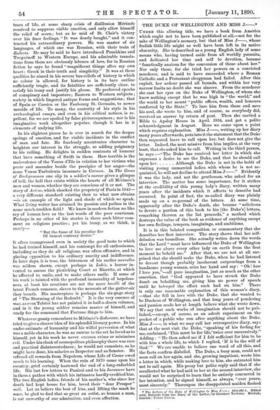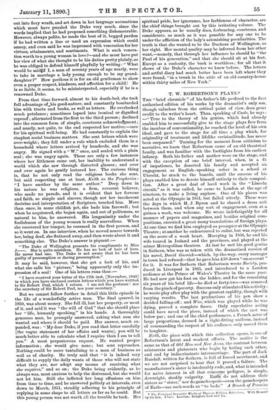THE DUKE OF WELLINGTON AND MISS J—.* UNDER this alluring
title, we have a book from America which ought not to have been published at all,—not for the sake of Wellington's memory, but that of Miss J—, whose- foolish little life might as well have been left in its native obscurity, she is described as a young English lady of some means who, having turned aside from all worldly pursuits, and dedicated her time and self to devotion, became- "fanatically anxious for the conversion of those about her." Nor only those, for she tried her powers on a convicted murderer, and is said to have succeeded where a Roman Catholic and a Protestant clergyman had failed. After this exploit, her ardour passed all bounds, and within her very narrow limits no doubt she was sincere. From the murderer- she cast her eyes on the Duke of Wellington, of whom she- knew nothing except that he was high in "the world," and the world to her meant " public offices, wealth, and honours conferred by the State." To lure him from these and save- his soul, she wrote to him, and of course, as everybody did, received an answer by return of post. Then she carried a Bible to Apsley House in April, 1834, and got a polite- acknowledgment in August. Here we come upon a point which requires explanation. Miss J—, writing up her diary many years afterwards, puts into it the statement that the Duke- then requested leave to call upon her, but does not give the- letter. Indeed, the next missive from him implies, at the very least, that she asked him to call. Writing in the third person, he says :—" The Duke has received her letter in which she- expresses a desire to see the Duke, and that he should call
upon her Although the Duke is not in the habit of visiting young unmarried ladies with whom he is not ac- quainted, he will not decline to attend Miss J—." Evidently it was the lady, and not the gentleman, who asked for an interview. The matter has some importance, for it strikes at the credibility of this young lady's diary, written many years after the incidents which it affects to describe had occurred. In point of fact, the so-called diary was plainly- made up on a re-perusal of the letters. At some time,. apparently after the Duke's death, she became " solicitous to devote a portion of this book to his [the Duke's] letters, remarking thereon as the list proceeds," a method which destroys the value of the book as evidence of anything except her own feelings, tempers, imaginings, and ambitions.
It is in this belated composition or commentary that she describes her first interview. The story shows that her self- delusion was boundless. She actually writes down the words that the Lord " must have influenced the Duke of Wellington to love me above every other lady on earth from the first moment he beheld me." After that, we are not at all sur- prised that she should make the Duke, when he had listened to devout though probably incoherent outpourings from a handsome young woman, seize her hand and say : " Oh ! how I love you,"—all pure imagination, just as much as the other assertion, that " God appeared to have struck the Duke dumb on beholding me, giving him no power of speech• until he betrayed the effect such had on him." There is only one reasonable explanation of this woman's diary, —that she fell in love with the Duke, that she wanted to- be Duchess of Wellington, and that long years of pondering• and passion made her at length believe what she wrote down._ We say that such works of imagination should not be pub- lished,—except, of course, as an adroit experiment on the pocket of a public who run after anything about the Duke.. Miss J—, in what we may call her retrospective diary, says that at the next visit the Duke, "speaking of his feeling for me, exclaimed, This must be for life,' twice over successively." Adding : " He then asked me if I felt sufficient for him to be with him a whole life, to which I replied, If it be the will of God." We are unable to believe one word of all this, and. the facts confirm disbelief. The Duke, a busy man, could not soon call on her again, and she, growing impatient, wrote him a letter in which, while making love to him, she entreated him not to call again. His prosy but polite reply said that if she recollected what he had said to ber at the second interview, she would not be surprised to learn that he entirely concurred in her intention, and he signed himself, as always, "ever yours, most sincerely." Thereupon the disappointed maiden flashed.
• The Letters of the Duke of Wellington to Miss .T—; 1851-1851. Edited with Extracts from the Diary of the Latter, by Christine Terhume Herrick. London : Fisher Unwin.
out into fiery wrath, and set down in hot language accusations which must have puzzled the Duke very much, since the words implied that he had proposed something dishonourable.
However, always polite, he made the best of it, begged pardon if he had written a line or used an expression which could annoy, and even said he was impressed with veneration for her virtues, attainments, and sentiments. What is such venera- tion worth to a young woman in love P—and she must have put ber view of what she thought to be his duties pretty plainly, as he was obliged to defend himself playfully by writing : " What would be saidlif I, a man of seventy years of age nearly, were to take in marriage a lady young enough to be my grand- daughter ?" How perilous it is for an old gentleman to show even a proper respect, kindness, and affection for a child! He is so liable, it seems, to be misinterpreted, especially if he is a renowned Duke.
From that time forward, almost to his death-bed, she took full advantage ofhis good-nature, and constantly bombarded him with tracts and books, as well as letters. He overlooked much petulance; sometimes lapsed into ironical or dignified reproof ; alternated from the first to the third person; declined into the common form of simple, courteous acknowledgment ; and nearly, not quite, to the end respected her motive,—care for his spiritual well-being. He had constantly to explain the simplest social business matters. She sent letters which were over-weight; they fell under a rule which excluded them in a household where letters arrived by hundreds, and she was angry. He signed with a " W." once, and sealed with a plain seal; she was angry again. These are only a few instances where her littleness came out, her inability to understand a world which she saw through distorted glasses ; and over and over again he gently lectured her. The curious thing is, that he not only read the religious books she sent, but said respecting one at least, Keith on the Prophecies : " I have another by the same author." Deep down in his nature he was religious, a firm, reverent believer, who made no parade, and it is evident that her fervour and faith, so simple and sincere, though not her incoherent doctrine and interpretation of Scripture, touched him. More than once, in some childish pet, she bade him farewell ; but when he acquiesced, she began again, and out of politeness, so natural to him, he answered. His longanimity under the foolishness of the young woman is really marvellous. When she recovered her temper, he resumed in the first person, and so it went on. In one interview, when he moved nearer towards her, being deaf, she fluttered away, and then wrote about it and something else. The Duke's answer is piquant " The Duke of Wellington presents his compliments to Miss J—. She is quite mistaken. He has no lock of hair of hers. He never had one. The Duke is not aware that he has been guilty of presumption or daring presumption."
It may be said, however, that she got a lock of his, and what she calls his " picture," being apparently only the im- pression of a seal! One of his letters runs thus :— " I have received your letter of the 17th inst. [November, 1849] in which you have enclosed certain letters which you have written to Sir Robert Peel, which I return. I am not the postman ! nor the secretary of Sir Robert Peel, nor your secretary."
But we cannot follow further in detail this little episode in the life of a wonderfully active man. The final quarrel, in 1850, was about money. She fell ill, lost her property, or most
of it, and said it was " the will of God " that she should place her " life, humanly speaking," in his hands. A thoroughly generous man, he promptly answered, asking what sum she wanted and where it should be paid. Her answer, much ex- panded, was : "My dear Duke, if you read that letter carefully [the vague statement of her affairs and wants], you will be much better able to calculate what I require than I am to tell
you." A most preposterous request. He wanted proper information; she would give none; but sent reproaches.
Nothing could be more tantalising to a man of business as well as of charity. He truly said that " it is indeed very
difficult to supply the daily wants of those who will not state what they are, nor adopt any means of receiving what she requires," and so on ; the Duke being evidently, as he
always was, most anxious to help the distressed, but she would not let him. Still she inflicted her long effusions on him from time to time, and he answered politely at intervals, even down to March, 1851, steadily adhering to his principle of replying in some shape to all letters as far as he could. But this young person was not worth all the trouble he took. Her spiritual pride, her ignorance, her feebleness of character, are the chief things brought out by this irritating volume. The Duke appears, as he usually does, forbearing, courteous, and considerate, as much as it was possible for any one to be under the affliction of the lady's astonishing peculiarities. The truth is that she wanted to be the Duchess of Wellington, as her right. Her mental quality may be inferred from her other want, —namely, that through her influence he should be "the Paul of his generation," and that she should sit at his feet. Except as a curiosity, the book is worthless ; for all that it shows of the Duke's character we knew before. The letters and artful diary had much better have been left where they were found, "in a trunk in the attic of an old country-house within thirty miles of New York."







































 Previous page
Previous page